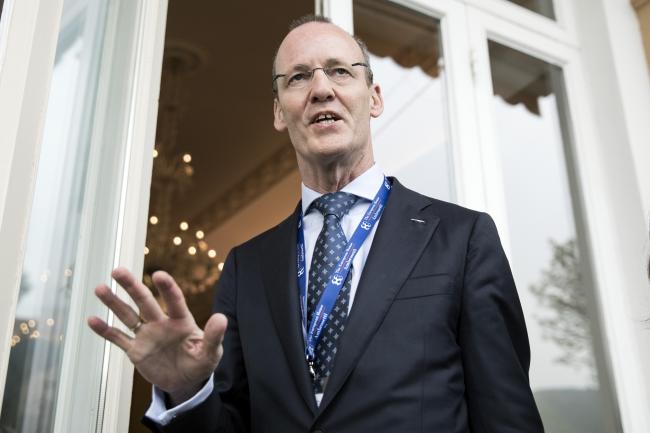(Bloomberg) -- Go inside the global economy with Stephanie Flanders in her new podcast, Stephanomics. Subscribe via Pocket Cast or iTunes.
The European Central Bank’s new round of loans for banks needs to be “more conservative and less generous” than the previous one, according to Governing Council member.
The ECB doesn’t “want to prolong dependence of the banking sector on longer-term funding from central bank any longer than necessary,” the Dutch governor said in a Bloomberg Television interview with Francine Lacqua at the International Monetary Fund gathering in Washington. Details of the new program “will be forthcoming in one of future meetings.”
ECB President Mario Draghi said on Wednesday that the assessment of the economic outlook will determine how stimulative the bank-loan program should be, amid mounting concern that the growth recovery projected for the second half of the year may not materialize.
Knot, one of the most hawkish members of the Governing Council, declined to speculate on what measures policy makers will need to deploy if the slowdown continues, adding that they are dealing with a soft patch for now.
“We were never out of ammunition,” he said. “If we need ammunition we can find ammunition.”
The Dutchman also expressed his opposition to a potential move by the ECB to soften the effect of its negative interest rates on banks, insisting that the policy has actually stimulated credit growth.
“I would prefer stronger banks, but mainly for financial stability,” Knot said, adding that it was “a little bit outside the realm of monetary objectives.”
Draghi’s comments last month that the ECB might need to mitigate the impact of almost half a decade of its sub-zero policy sparked speculation that officials could introduce a so-called tiering system that exempts some bank deposits from the negative rate.
Speaking in Washington earlier on Thursday, French central bank Governor Francois Villeroy de Galhau said the ECB will look at the impact as part of its regular assessment of policy. Villeroy, who has long called for rethink of institution’s negative interest rates, refused to be drawn into a discussion on potential measures that could be adopted.
His colleague, Bank of Italy Governor Ignazio Visco, said that the ECB’s June meeting will be a key moment both for the so-called TLTRO program of bank loans, and its sub-zero rate policy.
“We will certainly take a view on the parameters of the TLTROs, and associated with that, obviously all that has been discussed,” he told reporters in Washington. On negative rates, “we said that the side effects will be considered and obviously this is the time span that we have in mind.”
